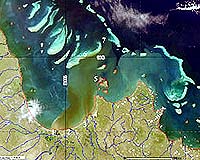| . |  |
. |
Canberra, Australia (SPX) Jul 09, 2009 The world's peak ocean science body has adopted a new definition of seawater developed by Australian, German and US scientists to make climate projections more accurate. In Paris late last month the General Assembly of UNESCO's Intergovernmental Oceanographic Commission (IOC) accepted the case for the introduction of a new international thermodynamic description of seawater, cast in terms of a new salinity variable called Absolute Salinity. Hobart-based CSIRO Wealth from Oceans Flagship scientist, Dr Trevor McDougall, made the case during his presentation of the Bruun Memorial Lecture to the Paris meeting. "Scientists will now have an accurate measure of the heat content of seawater for inclusion in ocean models and climate projections," Dr McDougall says. "Variations in salinity and heat influence ocean currents and measuring those variations are central to quantifying the ocean's role in climate change. The new values for salinity, density and heat content should be in widespread use within 18 months." Marine scientists have been searching for the 'magic formula' for measuring salinity - which varies from ocean to ocean and between tropical, temperate and polar regions - for more than 150 years. "These variations in salinity and temperature are responsible for driving deep ocean currents and the major vertical overturning circulations of the world's oceans, which transfer ocean heat towards the Arctic and Antarctic regions," Dr McDougall says. Unchanged since the last assessment 30 years ago, the case to review ocean thermodynamic measurements began in 2005 when the Scientific Committee on Oceanic Research (SCOR) established a working group, chaired by Dr McDougall. Supporting him were Dr Rainer Feistel from the Leibniz-Institut fur Ostseeforschung in Warnemunde (Germany), Dr Frank Millero, from the Rosenstiel School of Marine and Atmospheric Science at the University of Miami in Florida, Dr Dan Wright of the Bedford Institute of Oceanography, Canada and Dr David Jackett of CSIRO. Salinity, comprising the salts washed from rocks, is measured using the conductivity of seawater - a technique which assumes that the composition of salt in seawater is the same in all the world's oceans. "The new approach, involving Absolute Salinity, takes into account the changes in the composition of seasalt between different ocean basins which, while small, are a factor of about 10 larger than the accuracy with which scientists can measure salinity at sea," Dr McDougall says. Until the new description of seawater is widely adopted, ocean models will continue to assume that the heat content of seawater is proportional to a particular temperature variable called "potential temperature". "The new description allows scientists to calculate the errors involved by using this approximation while also presenting a much more accurate measure of the heat content of seawater, namely Conservative Temperature," Dr McDougall says. "The difference is mostly less than 1 degrees C at the sea surface, but it is important to correct for these biases in ocean models." Share This Article With Planet Earth
Related Links CSIRO Marine and Atmospheric Research Water News - Science, Technology and Politics
 Australia pledges millions for Great Barrier Reef
Australia pledges millions for Great Barrier ReefSydney (AFP) July 2, 2009 Australia Thursday pledged 52 million dollars (42 million US) to improve water quality on the Great Barrier Reef, which is coming under increasing threat from toxic chemicals and climate change. Environment Minister Peter Garrett said the money would go to conservation and agriculture groups to help local farmers reduce run-off of pesticides and other chemicals into the World Heritage-listed ... read more |
|
| The content herein, unless otherwise known to be public domain, are Copyright 1995-2009 - SpaceDaily. AFP and UPI Wire Stories are copyright Agence France-Presse and United Press International. ESA Portal Reports are copyright European Space Agency. All NASA sourced material is public domain. Additional copyrights may apply in whole or part to other bona fide parties. Advertising does not imply endorsement,agreement or approval of any opinions, statements or information provided by SpaceDaily on any Web page published or hosted by SpaceDaily. Privacy Statement |